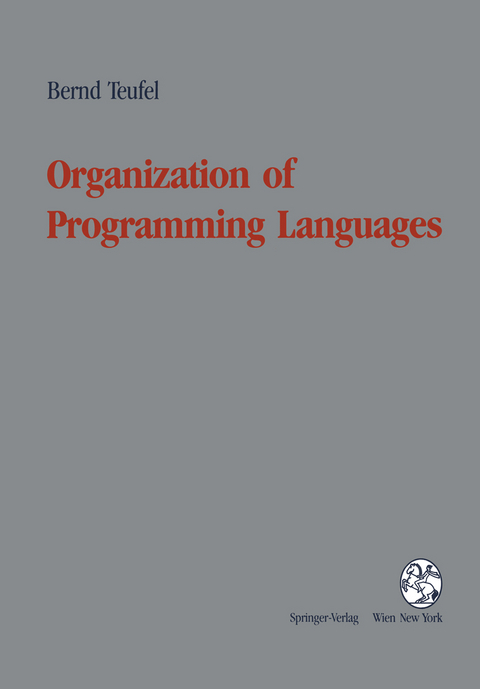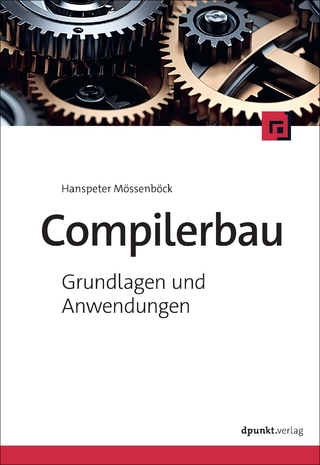
Organization of Programming Languages
Springer Wien (Verlag)
978-3-211-82315-6 (ISBN)
Höhere Programmiersprachen und die ihnen zugrunde liegenden Konzepte bilden das Thema des Buches. Neben der Evolution der Programmiersprachen werden die wichtigsten Aspekte zur Übersetzung von Programmiersprachen betrachtet. Des weiteren werden Datentypen, Ausdrücke und Kontrollstrukturen, Prozeduren, Datenkapselung, Vererbung und Nebenläufigkeit im Detail diskutiert. Die drei wichtigsten Ansätze zur Beschreibung der Semantik von Programmiersprachen werden ansatzweise erläutert. Die unterschiedlichen Konzepte werden mit Beispielen aus den Sprachen ADA, PASCAL, MODULA-2, OBERON, C++, SIMULA 67, SMALLTALK-80 und EIFFEL verdeutlicht.
Beside the computers itself, programming languages are the most important tools of a computer scientist, because they allow the formulation of algorithms in a way that a computer can perform the desired actions. Without the availability of (high level) languages it would simply be impossible to solve complex problems by using computers. Therefore, high level programming languages form a central topic in Computer Science. It should be a must for every student of Computer Science to take a course on the organization and structure of programming languages, since the knowledge about the design of the various programming languages as well as the understanding of certain compilation techniques can support the decision to choose the right language for a particular problem or application. This book is about high level programming languages. It deals with all the major aspects of programming languages (including a lot of examples and exercises). Therefore, the book does not give an detailed introduction to a certain program ming language (for this it is referred to the original language reports), but it explains the most important features of certain programming languages using those pro gramming languages to exemplify the problems. The book was outlined for a one session course on programming languages. It can be used both as a teacher's ref erence as well as a student text book.
1 Principles of Programming Languages.- 1.1 Evolution of Programming Languages.- 1.2 Backus, Hoare, and Wirth.- 1.3 The Concept of Abstraction.- 1.4 Basic Terminology and Language Descriptions.- 2 Language Processing.- 2.1 Syntax vs Semantics.- 2.2 Formal Languages and Grammars.- 2.3 Compiler Aspects.- 2.4 Run-time Environments.- 3 Data Types.- 3.1 Specifications.- 3.2 The Concept of Binding.- 3.3 Elementary Data Types.- 3.4 Structured Data Types.- 3.5 Abstract Data Types.- 3.6 Type Checking.- 3.7 Implementation of Data Types.- 3.8 Variables: Scope and Lifetime.- 4 Expressions and Control Structures.- 4.1 Expressions and Operators.- 4.2 Implicit and Explicit Control.- 4.3 Selection Statements.- 4.4 Repetition Statements.- 4.5 Procedure Calls and Exception Handling.- 4.6 Coroutines and Tasks.- 5 Procedures.- 5.1 Basic Ideas.- 5.2 Parameter Passing.- 5.3 Procedure Parameters.- 5.4 Overloading.- 5.5 Generic Concepts.- 5.6 Procedure Implementation.- 6 Data Encapsulation.- 6.1 Abstraction, Information Hiding, and Encapsulation.- 6.2 Classes in SIMULA 67.- 6.3 Classes in C++.- 6.4 Classes in EIFFEL.- 6.5 Abstract Data Types in MODULA-2.- 6.6 Abstract Data Types in ADA.- 7 Inheritance.- 7.1 Basic Ideas.- 7.2 Subranges and Subtypes.- 7.3 Extended Types in OBERON.- 7.4 Inheritance in SIMULA 67.- 7.5 Inheritance in SMALLTALK-80.- 7.6 Inheritance in C++.- 8 Concurrency.- 8.1 Basic Ideas.- 8.2 Coroutines in SIMULA 67.- 8.3 Semaphores.- 8.4 Monitors.- 8.5 Messages.- 8.6 Concurrency in ADA.- 9 Semantics.- 9.1 Why Formal Semantics?.- 9.2 Operational Semantics.- 9.3 Denotational Semantics.- 9.4 Axiomatic Semantics.- Exercises.- References.
| Erscheint lt. Verlag | 23.9.1991 |
|---|---|
| Zusatzinfo | XI, 208 p. 50 illus. |
| Verlagsort | Vienna |
| Sprache | englisch |
| Maße | 170 x 244 mm |
| Gewicht | 425 g |
| Themenwelt | Mathematik / Informatik ► Informatik ► Programmiersprachen / -werkzeuge |
| Informatik ► Theorie / Studium ► Compilerbau | |
| Schlagworte | Compiler • C++ programming language • Data Types • EIFFEL • Oberon • PASCAL • Processing • Programmiersprache • programming • Programming language • selection • Semantics |
| ISBN-10 | 3-211-82315-8 / 3211823158 |
| ISBN-13 | 978-3-211-82315-6 / 9783211823156 |
| Zustand | Neuware |
| Haben Sie eine Frage zum Produkt? |
aus dem Bereich


